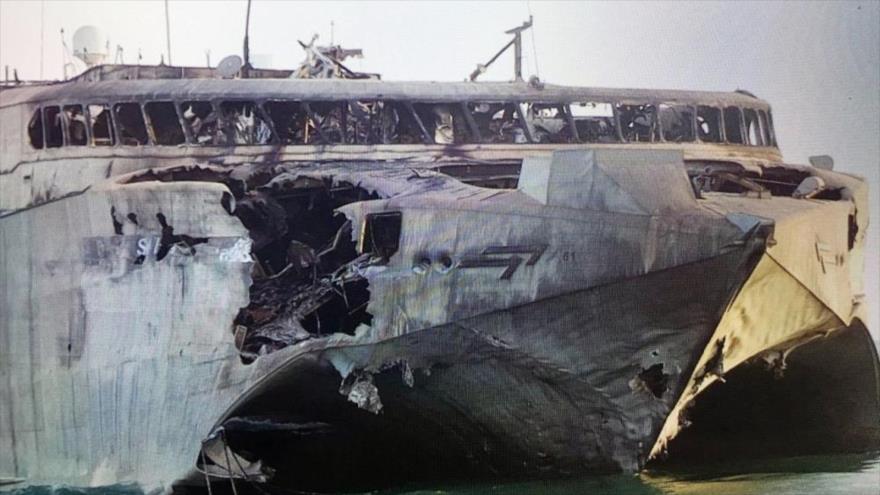The HSV-2 Swift, formerly an original proof-of-concept ship for the U.S. Navy’s Joint High Speed Vessel program, was gutted by explosion and fire when Houthi rebels attacked the ship off Yemen Oct. 1.
Operated by the United Arab Emirates, the 321’x88’x11’ Swift was transiting the Bab Al Mandeb strait between the Red Sea and the Gulf of Aden when it was struck at night. Gutted by the attack but still floating, the vessel was moved to Eritrea for salvage.
Photos released by the Emirates News Agency showed the riddled, burned catamaran with a massive hole in its starboard bow. A Houthi rebel group allied with Iran claimed its fighters targeted the vessel with a C-802 anti-ship missile, a weapon of Chinese design.
If true, such missiles could be a major new threat to Red Sea shipping, warned Stratfor, the Austin, Texas, based business and strategic intelligence firm. Two U.S. guided missile destroyers are in the area to keep shipping lanes to the Suez Canal open.

The HSV-2 Swift when in U.S. Navy service. U.S. Navy photo.
Built in Australia in 2003 by Incat, the Swift was an early prototype for the U.S. Navy’s vision of high-speed multihull transports. Under lease to the U.S. Military Sealift Command, the vessel showed its ability for rapid response, with top speed around 45 knots, cruising speed of 30 knots, and 600 tons of cargo capacity.
Designed to deliver troops, supplies and vehicles for the American military, the Swift excelled in humanitarian missions, notably relief efforts after the December 2004 Indian Ocean tsunami and hurricane Katrina in 2005, when it delivered supplies to Gulf of Mexico communities cut off by road damage.
The concept evolved into today’s class of 103-meter Joint High Speed Vessels, starting with the USNS Spearhead (JHSV1), built by Austal USA in Mobile, Ala., and christened in 2011. Austal has so far built six for the JSHV fleet.
After the Spearhead replaced it in U.S. service in 2013, the Swift was leased to the UAE and operated with a crew of 17 contract mariners.
Arab coalition forces battling the Houthi said the UAE ship was on a humanitarian mission to carry medical supplies to the war zone and bring out wounded civilians. Days later there were conflicting reports of casualties from the attack, including up to 22 dead.




